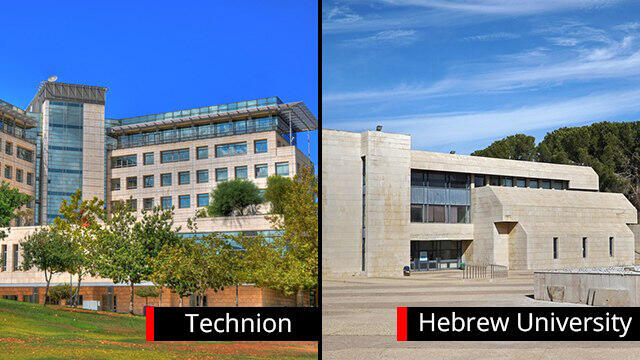Getting your Trinity Audio player ready...
Two Israeli universities, the Technion—Israel Institute of Technology and the Hebrew University of Jerusalem, were included in the annual list of world’s best universities published by Academic Ranking of World Universities, also known as Shanghai Ranking.
The two universities are ranked 77th and 95th on the list, respectively.
Both academic institutions went up in rankings since 2017, with the Technion going up 16 places from last year’s 93rd spot, while the Hebrew University was not in last year's top 100 at all.
A few weeks ago, a similar list was published but with an emphasis on fields of study. In that list, the Faculty of Law at the Hebrew University reached the 35th place in the worldwide rankings, while the university's mathematics department was placed 19th.
The Faculty of Aerospace Engineering at the Technion took the 22nd spot, and the Faculty of Biology at Tel Aviv University was ranked between 51th and 75th place.
Harvard University in Boston topped the Shanghai Ranking’s list, followed by Stanford, Cambridge, Massachusetts Institute of Technology (MIT), University of California in Berkeley, Princeton, Oxford, Columbia University, the California Institute of Technology (Caltech) and the University of Chicago.
Hebrew University President Prof. Asher Cohen praised the efforts of university’s academic staff. "The upward trend in the rankings since the end of last year is a testament to hard work and uncompromisingly striving for excellence by members of the academic community and the university," he said.
"We are proud that this year the Hebrew University is recognized as one of the top 100 universities in the world. The competition is becoming more challenging each year, especially in light of massive investments in academia made by countries in East Asia, compared to investments in Israel," he added.
The Shanghai rankings are determined, among other things, by the number of Nobel Prize winners produced by the academic institution and the number of publications published in leading academic and scientific journals.
Nevertheless, it should be emphasized that despite the improved rating, the Hebrew University has been dealing with an economic crisis over the past few years, accumulating more than NIS 900 million in debt. A recovery plan, signed by the university and the Ministry of Finance in February, will inject NIS 700 million over the next 10 years and save the university from bankruptcy.
Technion President Prof. Peretz Lavie also thanked the hard work of the institution’s academic and administrative staff.
"The Technion being on the list for seven consecutive years is the result of hard work and dedication by the Technion's administration, faculty members and employees. The university’s staff is accepted based on only one criteria—excellence.
"In order to elevate further the Technion's status as the world's leading scientific-technological research university, we are also working on the global front … Regardless of the international rankings, we continually improve ourselves, but it is clear that our rise in the Shanghai ratings is an exciting stamp of international approval of the Technion’s excellence," he exclaimed.


